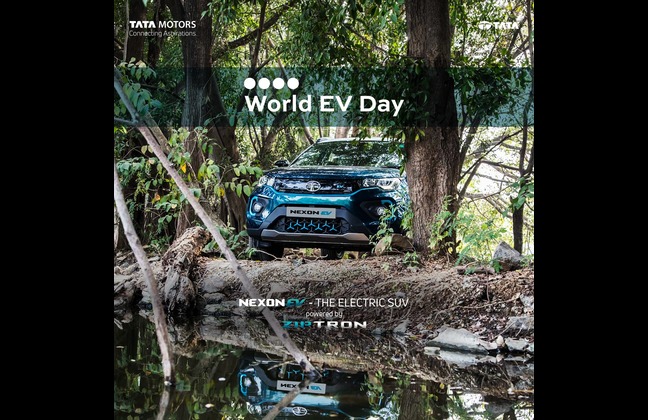July 8, 2025
Tata Motors Group global wholesales at 2,99,664 in Q1 FY26
Read more
Access our latest announcements, results, share price information and other resources here

The company is one of the founding partners behind this worldwide movement
Tata Motors proudly joins the global #WorldEVDay movement to celebrate the shift to sustainable road transport and a zero-emissions future. Scheduled to be inaugurated on September 9th, the #WorldEVDay will be celebrated every year to encourage current and prospective drivers of electric vehicles, local transport authorities and fleet operators to recognize the vital role they play in enabling a truly sustainable transport ecosystem. Launched in conjunction with the Swedish-Swiss firm ABB and sustainability media company Green.TV, Tata Motors is one of the founding partners for the #WorldEVDay.
Commenting on the partnership, Mr. Shailesh Chandra, President, Passenger Vehicle Business Unit, Tata Motors said “India has seen a significant rise in the momentum towards EVs in the past several months and we at Tata Motors are proud to be one of the frontrunners in driving EVs adoption here. We are not only offering aspirational and accessible electric vehicles, but are also creating a holistic e-Mobility ecosystem that addresses barriers to EV adoption. We are delighted to join this global #WorldEVDay movement to propagate the dynamic role e-mobility plays in a sustainable and zero emission future”
Commenting on the partnership Ade Thomas, Founder of Green.TV said, “World EV Day is a global movement that will really turn the dial on sustainable mobility and we are delighted to be partnering with Tata Motors who has been at the forefront of this evolution in India. World EV Day aims to celebrate e-mobility solutions across the globe and will also look to address the wider role of climate change and air quality.”
Key elements of an EV ecosystem include charging solution, supplier base for EV components, vehicle financing, and mobility service providers. Tata Motors is one of the foremost players in India to have supported the development of EV ecosystem in India. The company recently launched “Tata uniEVerse” that closely leverages the strengths and expertise of other Tata Group companies to create a holistic and a viable environment to drive the adoption of electric vehicles in India. Recently, the company also launched the Tata Nexon EV – an aspirational SUV for personal car buyers looking for a thrilling, connected drive experience with zero emissions and attractive pricing.
For more details about the #WorldEVDay movement, visit the https://www.worldevday.org/ website or follow Tata Motors on –
FB: https://www.facebook.com/TatamotorsElectricMobility/
Instagram: https://www.instagram.com/tatamotorselectricmobility/?hl=en
YouTube: https://www.youtube.com/channel/UCDxNSMn2l95fyHzPATAYOcg
Twitter: https://twitter.com/tatamotorsev?lang=en
About Tata Motors
Tata Motors Limited (NYSE: TTM; BSE: 500570 and 570001; NSE: TATAMOTORS and TATAMTRDVR), a USD 44 billion organization, is a leading global automobile manufacturer of cars, utility vehicles, pick-ups, trucks and buses. Part of the USD 110 billion Tata group, Tata Motors is India’s largest and the only OEM offering extensive range of integrated, smart and e-mobility solutions. It has operations in India, the UK, South Korea, Thailand, South Africa, and Indonesia through a strong global network of 134 subsidiaries, associate companies and joint ventures, including Jaguar Land Rover in the UK and Tata Daewoo in South Korea.
With a focus on engineering and tech enabled automotive solutions catering to the future of mobility, Tata Motors is India’s market leader in commercial vehicles and amongst the top four in the passenger vehicles market. With ‘Connecting Aspirations’ at the core of its brand promise, the company’s innovation efforts are focused to develop pioneering technologies that are sustainable as well as suited to evolving aspirations of the market and the customers. Tata Motors strives to bring new products that fire the imagination of GenNext customers, fueled by state of the art design and R&D centres located in India, UK, US, Italy and South Korea. Internationally, Tata commercial and passenger vehicles are marketed in countries, spread across Africa, the Middle East, South Asia, South East Asia, South America, Australia, CIS, and Russia.

© Copyright 2025. All rights reserved. Tata Motors Limited.

